Short-acting insulin injections are primarily used to treat diabetes in both children and adults. These injections utilize synthetic insulin to help lower blood sugar and regulate blood sugar levels. While it doesn’t cure diabetes, it plays a significant role in managing type 1 and [type 2 diabetes](https://prohealthsupporter.com/type-1-vs-type-2-diabetes/) effectively.
### How Does Short-acting Insulin Work?
Here’s how this type of medication aids diabetes treatment:
– **Lowers blood sugar levels.**
– **Transports glucose from the blood into cells for energy use.**
– **Prevents the liver from overproducing sugar.**
Insulin is a hormone crucial for converting sugar into energy. For those with diabetes, the body either produces insufficient insulin or can’t use it properly. Consequently, doctors prescribe synthetic insulin to help control blood sugar levels and reduce the risk of complications associated with diabetes.
### Is Regular Insulin Short-acting?
Yes, short-acting insulin is also known as regular insulin. It is designed to cover insulin needs at mealtime and can be administered a bit before eating, unlike rapid-acting insulin.
### Short-acting Insulin Peak
Short-acting insulin typically takes 30 to 60 minutes to start working in your bloodstream. Its peak effect occurs within 2 to 3 hours, and its effects can last from 3 to 6 hours post-injection.
### Brand Names
Short-acting insulin is marketed under several brand names:
– **Humulin R**: Available as a liquid solution, this prescription medication helps manage blood sugar levels in both adults and children with type 1 or type 2 diabetes. It comes in two dosages: Humulin R U-100 and Humulin R U-500.
– **Novolin R**: This type of insulin helps control blood sugar levels for several hours a day. Adjusting to the correct dose may require some trial and error. This medication is available over the counter without a prescription.
### Side Effects of Short-acting Insulin
Common side effects include:
– Bumps, swelling, or itching at the injection site
– Muscle pain
– Weight gain
More serious side effects can include:
– Difficulty breathing
– Wheezing
– Fast heart rate
– Heart failure
– Hyperglycemia
– Severe allergic reactions
If your healthcare provider has prescribed short-acting insulin, adhere strictly to the prescribed dose, and do not make any changes or stop the medication without prior consultation. Persistent symptoms should prompt a visit to your nearest healthcare provider for further evaluation.
